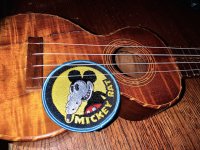I'm gonna retire from ranting on this thread after this (but not reading), like "Clear" says you know it when you know it and if you've never experienced it maybe it's the instruments you've played that aren't capable of opening up in the manner we've experienced (as we know not all instruments are created equal). I'm gonna add a few points on the way out that take both sides of the argument.
1. For a new or unused instrument to open up it needs to be played, and it needs to be played loud to "wake it up". In my assessment what opens up probably has a lot to do with the instruments natural vibrations from being played, entropy is a factor and in the chaos the structures may move around and adapt better to playing their natural overtones from the kinetic response (the key!!). If you're just plink plink plinking i don't think you'll ever notice any change.
2. Perhaps over time it's not the instrument but the player getting better and by doing so can make subtle adaptations to their playing style to get the most out of their instrument (like a battle of strong willed forces coming to a compromise).
3. A bunch of other factors including: playing in different rooms, the weather (humidity, dryness, barometric pressure), the way you hold your instrument, strings, technique, etc. When dealing with wooden instruments and humidity you can't help but think of the wood acting like a sponge when the humidity is high. Playing vigorously might move the moisture trapped in the wood around (entropy!) and by doing so improve it's volume, sustain, and tone. I'd think something totally dried out wouldn't work as well (i'm not a luthier so correct me if i'm wrong).
4. My last suggestion comes from the point of view of the individual "master" who makes a superb instrument and knows his/her materials well enough to bend to it's will as much as it can be bent. Michelangelo is a good illustration of this based on his writings and others observations of him in his time. He'd select particular slabs of marble to carve and could see a figure trapped in it, his obligation was to free it from it's geometric prison. When executing a commission he may have had a composition in mind prior to "meeting the slab" but made compromises with the stone itself, like a negotiation. I'd like to think a good luthier does the same with the selected wood, recognizing you can't stretch a bigger cut of wood to make a tenor when all the wood will give you is a good enough section in it's long cut to make a soprano. Also considering how thin can you get away with to maximize vibration and other factors. I'm certain it fluctuates from cut to cut and only years of experience will help an artist/luthier make those decisions. Even Stradivarius had clunkers, which is why only certain of his instruments are considered highly prized and are referred to as made during his "golden period".
For fun, if you're curious, see if playing with a pick and strumming as loud and forcefully as you can on and off for a few hours over a few days and see if you notice any improvement, or spring for the
ToneRite and hook it up for a week. Report back.

